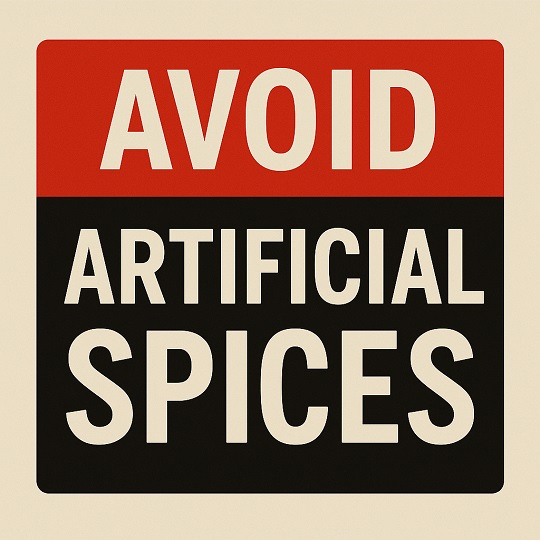
Avoid Artificial Spices. In today’s fast-paced world, artificial spices and seasonings have become a convenient solution for adding flavor to meals. Found in a variety of processed foods, canned goods, fast food, and packaged snacks, artificial spices are chemically manufactured additives used to mimic the flavor of natural herbs and spices. While they may enhance taste, they come with serious health and wellness concerns. This article explores why you must avoid artificial spices and opt for natural alternatives instead.
What Are Artificial Spices?
Artificial spices are synthetic flavor enhancers made in laboratories to replicate the taste, aroma, and color of natural spices. These include artificial flavorings, monosodium glutamate (MSG), chemical preservatives, and food colorings such as Yellow No. 5 or Red No. 40. Unlike natural herbs like ginger, turmeric, or black pepper, these additives are not derived from plants but are man-made using industrial chemicals.
1. Linked to Chronic Health Problems
One of the biggest reasons to avoid artificial spices is their association with chronic health conditions:
- Hypertension and Heart Disease: Some artificial flavor enhancers like MSG and sodium-based preservatives increase blood pressure and may contribute to cardiovascular diseases.
- Cancer Risk: Studies suggest that certain artificial coloring agents may be carcinogenic when consumed in large amounts over time.
- Diabetes and Obesity: Artificial spices often come with hidden sugars and sodium that can affect insulin levels, contributing to obesity and Type 2 diabetes.
2. Trigger Allergic Reactions and Sensitivities
Artificial spices can cause allergic reactions or food intolerances in sensitive individuals. Common symptoms include:
- Skin rashes
- Headaches
- Digestive upset
- Breathing difficulties
For example, sulfites used as preservatives in artificial spice blends can trigger asthma attacks in some people.
3. Disrupt Gut Health
The gut is home to trillions of beneficial bacteria that regulate digestion, immunity, and mood. Artificial spices and flavorings often contain preservatives and emulsifiers that can harm these gut bacteria, leading to:
- Inflammation
- Bloating
- Constipation or diarrhea
- Poor nutrient absorption
A disrupted gut microbiome may also affect your mental health due to the gut-brain connection.
4. Contain Harmful Chemicals
Many artificial spices contain harmful substances such as:
- Propylene glycol (a synthetic carrier used in liquid seasonings)
- BHA and BHT (preservatives that may cause cancer)
- Artificial sweeteners like aspartame, which have been linked to neurological effects
These chemicals accumulate in the body over time and may damage vital organs like the liver and kidneys.
5. Mask Poor Food Quality
Artificial spices are often used to enhance the flavor of low-quality or stale ingredients. This creates an illusion of freshness and flavor, deceiving consumers and allowing manufacturers to cut costs while compromising food quality.
6. Encourage Overeating and Food Addiction
Synthetic flavor enhancers like MSG and other artificial compounds are designed to make food taste more satisfying, which can override the body’s natural satiety signals. This results in:
- Cravings for unhealthy foods
- Overeating
- Emotional eating
- Food addiction
Long-term consumption may lead to weight gain and poor dietary habits.
7. Harm Children’s Development
Children are more vulnerable to the effects of artificial additives due to their developing organs and nervous systems. Studies have linked artificial food colors and preservatives to:
- Hyperactivity and ADHD
- Poor academic performance
- Sleep disturbances
Avoiding artificial spices in your child’s diet helps protect their health and development.
8. Environmental Impact
The production of artificial spices involves industrial processes that release harmful chemicals into the environment. These pollutants can affect air and water quality and contribute to long-term ecological damage. Choosing organic or naturally grown spices supports sustainable farming and reduces your carbon footprint.
9. Lack of Nutritional Value
Artificial spices offer no vitamins, minerals, or antioxidants compared to natural spices like turmeric (rich in curcumin), cinnamon (which regulates blood sugar), or garlic (with immune-boosting properties). Natural spices not only enhance taste but also contribute to overall wellness.
10. Legal but Not Necessarily Safe
Just because a chemical additive is approved by regulatory bodies doesn’t mean it’s completely safe. Many artificial ingredients are allowed under “Generally Recognized As Safe” (GRAS) status, but new studies frequently uncover long-term health risks. Consumers should stay informed and read labels critically.
Healthier Alternatives to Artificial Spices
Switching to natural spices not only boosts flavor but also adds numerous health benefits. Consider these alternatives:
- Turmeric: Anti-inflammatory and antioxidant
- Ginger: Aids digestion and relieves nausea
- Cumin: Improves immunity and gut health
- Black pepper: Enhances nutrient absorption
- Garlic and onion powders: Flavor-rich and anti-microbial
Use fresh herbs like basil, rosemary, thyme, and parsley for vibrant, chemical-free meals.
Tips for Avoiding Artificial Spices
- Read Labels: Look for terms like “artificial flavoring,” “flavor enhancers,” or specific additives such as MSG, BHA, or E621.
- Cook Fresh Meals: Prepare meals at home using fresh ingredients and natural seasonings.
- Buy Organic: Choose certified organic spices and seasonings when possible.
- Avoid Fast Foods: These are often loaded with artificial flavorings to increase shelf life and addictiveness.
- Educate Yourself: Stay informed about food additives and their potential health effects.
Conclusion
Artificial spices may add convenience and instant flavor, but they come at a high cost to your health, well-being, and the environment. From chronic diseases to food sensitivities and even behavioral issues in children, the risks are too significant to ignore. Switching to natural, organic, and fresh spices is a simple yet powerful step toward a healthier, more vibrant life. Make the change today—your body will thank you.




